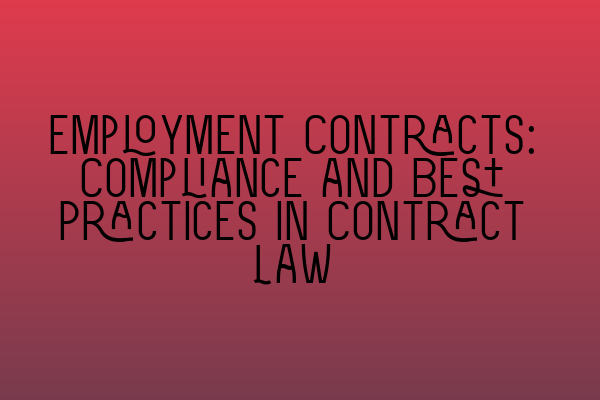Employment Contracts: Compliance and Best Practices in Contract Law
When it comes to employment contracts, compliance with contract law is essential for both employers and employees. Understanding the legal requirements and best practices can help protect the rights and interests of both parties. In this blog post, we will explore the key aspects of employment contracts and provide guidance on compliance and best practices.
1. Importance of Employment Contracts
Employment contracts serve as legally binding agreements between employers and employees. These contracts outline the terms and conditions of employment, including job responsibilities, compensation, working hours, benefits, and termination procedures. They provide clarity and certainty for both parties, ensuring that rights and obligations are clearly defined.
Without a written employment contract, disputes and misunderstandings can arise, leading to potential legal issues. Therefore, it is crucial for employers to create and maintain comprehensive employment contracts that comply with contract law and best practices.
2. Essential Elements of an Employment Contract
An employment contract should include certain essential elements to be legally valid and enforceable. These elements typically include:
- Names and addresses of both the employer and the employee
- Job title and description
- Starting date of employment
- Duration of the contract (if fixed-term)
- Salary and benefits
- Working hours and schedule
- Holiday and leave entitlements
- Notice period for termination
- Confidentiality and non-compete clauses (if applicable)
- Governing law and jurisdiction
Including these elements in an employment contract helps ensure clarity and transparency, reducing the likelihood of disputes between the employer and employee. It is important to note that employment contracts can vary depending on the nature of the job and the industry.
3. Compliance with Contract Law
Compliance with contract law is crucial when drafting and enforcing employment contracts. Failure to comply with contract law can render the contract unenforceable, leading to legal consequences for both parties.
Firstly, ensure that the contract complies with the requirements for a valid contract, such as offer, acceptance, consideration, and intention to create legal relations. It is essential to have a clear and mutual agreement between the employer and the employee for the contract to be legally binding.
Secondly, consider any statutory requirements that may impact the terms and conditions of employment. For example, minimum wage laws, working time regulations, and health and safety requirements must be taken into account when drafting employment contracts. Familiarizing yourself with these legal obligations can help avoid legal disputes and penalties.
Thirdly, be mindful of any industry-specific regulations or collective bargaining agreements that may affect the employment contract. Certain professions or sectors may have additional requirements or standards that need to be incorporated into the contract to ensure compliance.
Lastly, keep the employment contract updated and in line with any changes in legislation or regulations. Regularly reviewing and updating the contract can help ensure ongoing compliance and avoid potential legal issues.
4. Best Practices for Employment Contracts
In addition to compliance with contract law, following best practices when drafting and managing employment contracts can help create a positive work environment and prevent future disputes.
Real-life case studies and insights into legal practice and decision-making can provide valuable guidance when dealing with employment contracts. These resources offer practical examples and lessons from real-world scenarios, helping solicitors navigate complex legal issues.
Some best practices to consider include:
- Using clear and unambiguous language: Employment contracts should be written in a clear and understandable manner, avoiding complex legal jargon. This ensures that both parties fully comprehend their rights and obligations.
- Including dispute resolution mechanisms: Consider including arbitration or mediation clauses in employment contracts. These clauses can help resolve disputes efficiently and cost-effectively without resorting to litigation.
- Protecting confidential information and trade secrets: If relevant to the nature of the employment, include confidentiality and non-compete clauses to safeguard sensitive information and prevent employees from engaging in competition after termination.
- Reviewing and updating contracts regularly: As mentioned earlier, it is important to review and update employment contracts regularly to ensure compliance with changes in legislation or business requirements. This ensures that the contract remains relevant and effective.
By adopting these best practices, employers can create a solid foundation for their employment contracts, reducing the risk of legal disputes and protecting the interests of both parties involved.
5. Consulting a Solicitor
When it comes to employment contracts, seeking legal advice from a qualified solicitor is highly recommended. A skilled solicitor can provide expert guidance on contract law, ensure compliance, and help draft comprehensive and enforceable employment contracts.
If you are interested in pursuing a career in contract law or becoming a solicitor, you may find our related articles helpful:
- Exploring Solicitor Salaries in the UK: Average Earnings and Factors Affecting Income
- Mastering Client Relationship Management: Skills for Solicitors to Enhance Trust and Loyalty
- Pursuing a Law School Education in the UK: Choosing the Right Path for Your Future
- Securing Training Contracts: A Roadmap to Becoming a Solicitor
By regularly engaging with relevant resources and staying updated on legal developments, solicitors can provide the best possible advice to clients regarding employment contracts.
Conclusion
Employment contracts play a vital role in defining the rights and obligations of employers and employees. Compliance with contract law and best practices ensures clarity, transparency, and legal enforceability. By creating comprehensive employment contracts and seeking legal guidance when needed, employers can protect their interests and maintain a productive work environment.
